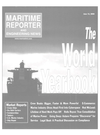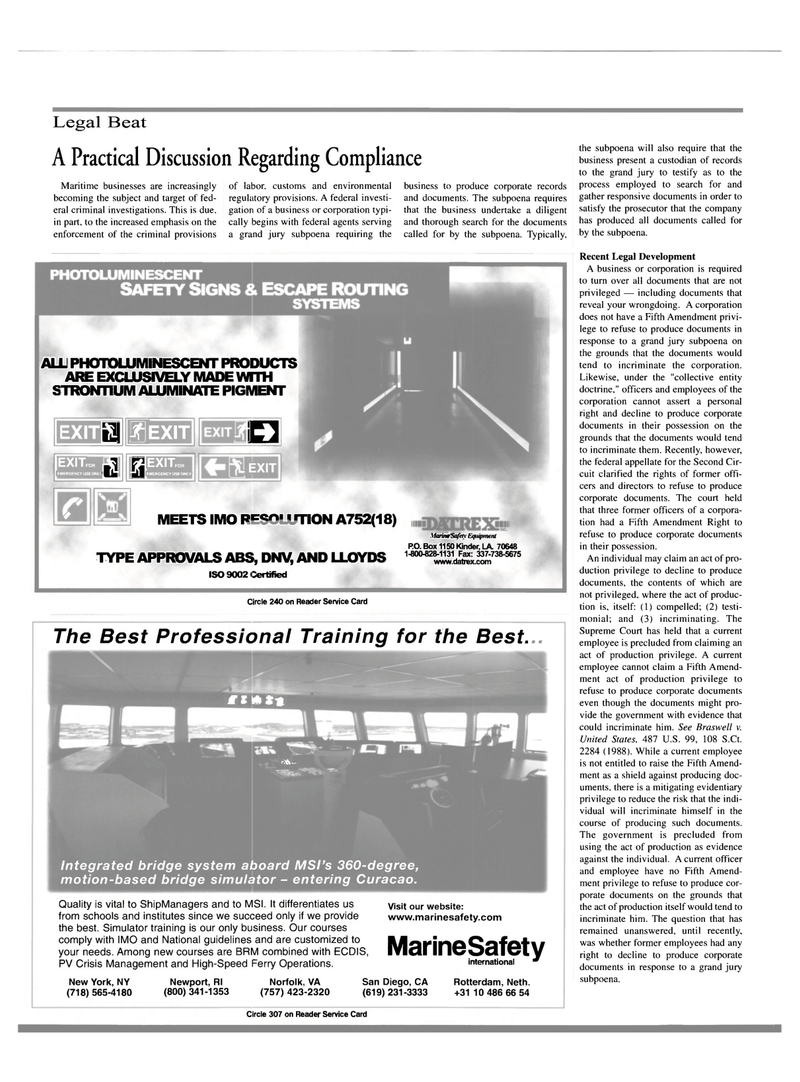
Page 14: of Maritime Reporter Magazine (June 15, 2000)
Read this page in Pdf, Flash or Html5 edition of June 15, 2000 Maritime Reporter Magazine
Legal Beat
A Practical Discussion Regarding Compliance
Maritime businesses are increasingly becoming the subject and target of fed- eral criminal investigations. This is due. in part, to the increased emphasis on the enforcement of the criminal provisions of labor, customs and environmental regulatory provisions. A federal investi- gation of a business or corporation typi- cally begins with federal agents serving a grand jury subpoena requiring the business to produce corporate records and documents. The subpoena requires that the business undertake a diligent and thorough search for the documents called for by the subpoena. Typically.
ALL PHOTOLUMINESCENT PRODUCTS
ARE EXCLUSIVELY MADE WITH
STRONTIUM ALUMINATE PIGMENT
EXIT 01 2 EXIT m
EXIT™
EMERGENCY USE ONLY •2 u
EXIT™
EMERGENCY USE ONLY EXIT
MEETS IMO RESOLUTION A752(18)
TYPE APPROVALS ABS, DNV, AND LLOYDS
ISO 90021 Certified
Marine Safety Equipment
P.O. Box 1150 Kinder, LA 70648 1-800-828-1131 Fax: 337-738-5675 www.datrex.com
Circle 240 on Reader Service Card
The Best Professional Training for the Best. fZAS-i a*-
Integrated bridge system aboard MSI's 360-degree, motion-based bridge simulator - entering Curacao.
Quality is vital to ShipManagers and to MSI. It differentiates us from schools and institutes since we succeed only if we provide the best. Simulator training is our only business. Our courses comply with IMO and National guidelines and are customized to your needs. Among new courses are BRM combined with ECDIS,
PV Crisis Management and High-Speed Ferry Operations.
Visit our website: www.marinesafety.com
Marine Safety international '
New York, NY (718) 565-4180
Newport, Rl (800) 341-1353
Norfolk, VA (757) 423-2320
San Diego, CA (619) 231-3333 international
Rotterdam, Neth. +31 10 486 66 54 the subpoena will also require that the business present a custodian of records to the grand jury to testify as to the process employed to search for and gather responsive documents in order to satisfy the prosecutor that the company has produced all documents called for by the subpoena.
Recent Legal Development
A business or corporation is required to turn over all documents that are not privileged — including documents that reveal your wrongdoing. A corporation does not have a Fifth Amendment privi- lege to refuse to produce documents in response to a grand jury subpoena on the grounds that the documents would tend to incriminate the corporation.
Likewise, under the "collective entity doctrine," officers and employees of the corporation cannot assert a personal right and decline to produce corporate documents in their possession on the grounds that the documents would tend to incriminate them. Recently, however, the federal appellate for the Second Cir- cuit clarified the rights of former offi- cers and directors to refuse to produce corporate documents. The court held that three former officers of a corpora- tion had a Fifth Amendment Right to refuse to produce corporate documents in their possession.
An individual may claim an act of pro- duction privilege to decline to produce documents, the contents of which are not privileged, where the act of produc- tion is, itself: (1) compelled; (2) testi- monial; and (3) incriminating. The
Supreme Court has held that a current employee is precluded from claiming an act of production privilege. A current employee cannot claim a Fifth Amend- ment act of production privilege to refuse to produce corporate documents even though the documents might pro- vide the government with evidence that could incriminate him. See Braswell v.
United States. 487 U.S. 99, 108 S.Ct. 2284 (1988). While a current employee is not entitled to raise the Fifth Amend- ment as a shield against producing doc- uments, there is a mitigating evidentiary privilege to reduce the risk that the indi- vidual will incriminate himself in the course of producing such documents.
The government is precluded from using the act of production as evidence against the individual. A current officer and employee have no Fifth Amend- ment privilege to refuse to produce cor- porate documents on the grounds that the act of production itself would tend to incriminate him. The question that has remained unanswered, until recently, was whether former employees had any right to decline to produce corporate documents in response to a grand jury subpoena.
Circle 307 on Reader Service Card

 13
13

 15
15
